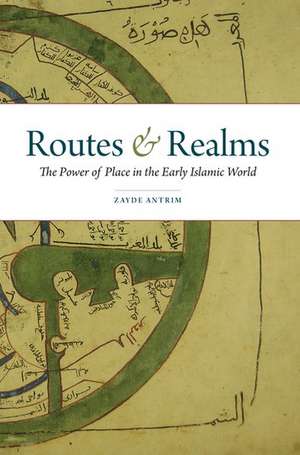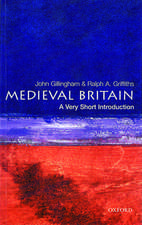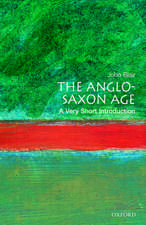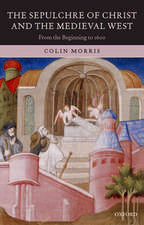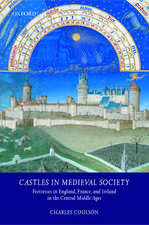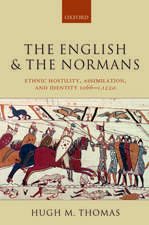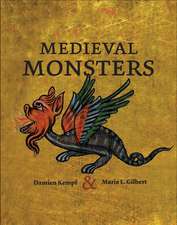Routes and Realms: The Power of Place in the Early Islamic World
Autor Zayde Antrimen Limba Engleză Paperback – 15 ian 2015
Preț: 248.33 lei
Nou
Puncte Express: 372
Preț estimativ în valută:
47.52€ • 51.60$ • 39.92£
47.52€ • 51.60$ • 39.92£
Carte tipărită la comandă
Livrare economică 12-18 aprilie
Preluare comenzi: 021 569.72.76
Specificații
ISBN-13: 9780190227159
ISBN-10: 019022715X
Pagini: 234
Ilustrații: 8 hts
Dimensiuni: 155 x 231 x 18 mm
Greutate: 0.34 kg
Editura: Oxford University Press
Colecția OUP USA
Locul publicării:New York, United States
ISBN-10: 019022715X
Pagini: 234
Ilustrații: 8 hts
Dimensiuni: 155 x 231 x 18 mm
Greutate: 0.34 kg
Editura: Oxford University Press
Colecția OUP USA
Locul publicării:New York, United States
Recenzii
Antrim's study...will effectively stimulate discussion on the very nature (and study) of early Islamic geography.
Zayde Antrim's monograph provides a guided tour through the menagerie of literatures that poets, litterateurs, religious schoalrs, travel writers , and geographers of this vast empire devised between the ninth and twelfth centuries.
Most of the texts Antrim uses will be very familiar to scholars of early Islamic history, but she has a talent for reading these in new, engaging and informative ways. Antrim has produced an innovative analysis of real importance which should be considered carefully by all who work on early Islamic history and the Arabic and Persian literary texts of the period.
The first comprehensive study of land and belonging in the premodern Islamic world Routes and Realms is a welcome addition to the study of medieval Muslim history. It challenges us to think about identity and belonging in new and compelling ways. It employs an innovative methodology for the analysis of texts that traverse conventional disciplinary boundaries and that highlights their extra-textual significance. It successfully makes the case for regionalism as a powerful category of belonging during the medieval period.
Antrim's findings have ramifications for historians of the modern period. As ethnosymbolists have argued, pre-existing notions of a homeland, of the kind that Antrim traces in classical Arabic literature, are a necessary condition for the emergence of nationalism. But the complexity of the notions of home vs. nonhome, inside vs. outside, and local vs. stranger that she highlights contributes to an understanding of the alternative and competing types of nationalism that have emerged in the Middle East in the twentieth century, that is, pan-Arabism and pan-Islamic nationalism as well as nationalism at the level of individual countries.
By exhaustively delineating early Muslim attitudes toward homeland, city, and regional identity, Zayde Antrim shows how early Muslims did, in fact, create their own ways of relating to the land beneath and around them, and hence a discourse of place with which any modern notions of nationhood would have needed to contend. It is a rare thing when the study of premodern history can enliven modern debates, but Antrim's work is one of those rarities.
Zayde Antrim's most significant contribution is that she challenges the dominant view that explains the rise of nationalism in the Middle East as a byproduct of the nineteenth century encounter with Europe. By critiquing this widely disseminated position, Antrim allows scholars of medieval and modern Middle East to realize that the concept of homeland represents at the same time continuity and change with the classical period, and therefore nationalism has invoked in the mind of medieval and modern Middle Easterners a complex web of legacies. She reminds us that good scholarship should be meticulous research and not speculation.
Zayde Antrim's monograph provides a guided tour through the menagerie of literatures that poets, litterateurs, religious schoalrs, travel writers , and geographers of this vast empire devised between the ninth and twelfth centuries.
Most of the texts Antrim uses will be very familiar to scholars of early Islamic history, but she has a talent for reading these in new, engaging and informative ways. Antrim has produced an innovative analysis of real importance which should be considered carefully by all who work on early Islamic history and the Arabic and Persian literary texts of the period.
The first comprehensive study of land and belonging in the premodern Islamic world Routes and Realms is a welcome addition to the study of medieval Muslim history. It challenges us to think about identity and belonging in new and compelling ways. It employs an innovative methodology for the analysis of texts that traverse conventional disciplinary boundaries and that highlights their extra-textual significance. It successfully makes the case for regionalism as a powerful category of belonging during the medieval period.
Antrim's findings have ramifications for historians of the modern period. As ethnosymbolists have argued, pre-existing notions of a homeland, of the kind that Antrim traces in classical Arabic literature, are a necessary condition for the emergence of nationalism. But the complexity of the notions of home vs. nonhome, inside vs. outside, and local vs. stranger that she highlights contributes to an understanding of the alternative and competing types of nationalism that have emerged in the Middle East in the twentieth century, that is, pan-Arabism and pan-Islamic nationalism as well as nationalism at the level of individual countries.
By exhaustively delineating early Muslim attitudes toward homeland, city, and regional identity, Zayde Antrim shows how early Muslims did, in fact, create their own ways of relating to the land beneath and around them, and hence a discourse of place with which any modern notions of nationhood would have needed to contend. It is a rare thing when the study of premodern history can enliven modern debates, but Antrim's work is one of those rarities.
Zayde Antrim's most significant contribution is that she challenges the dominant view that explains the rise of nationalism in the Middle East as a byproduct of the nineteenth century encounter with Europe. By critiquing this widely disseminated position, Antrim allows scholars of medieval and modern Middle East to realize that the concept of homeland represents at the same time continuity and change with the classical period, and therefore nationalism has invoked in the mind of medieval and modern Middle Easterners a complex web of legacies. She reminds us that good scholarship should be meticulous research and not speculation.
Notă biografică
Zayde Antrim is Charles A. Dana Associate Professor of History and International Studies at Trinity College.
